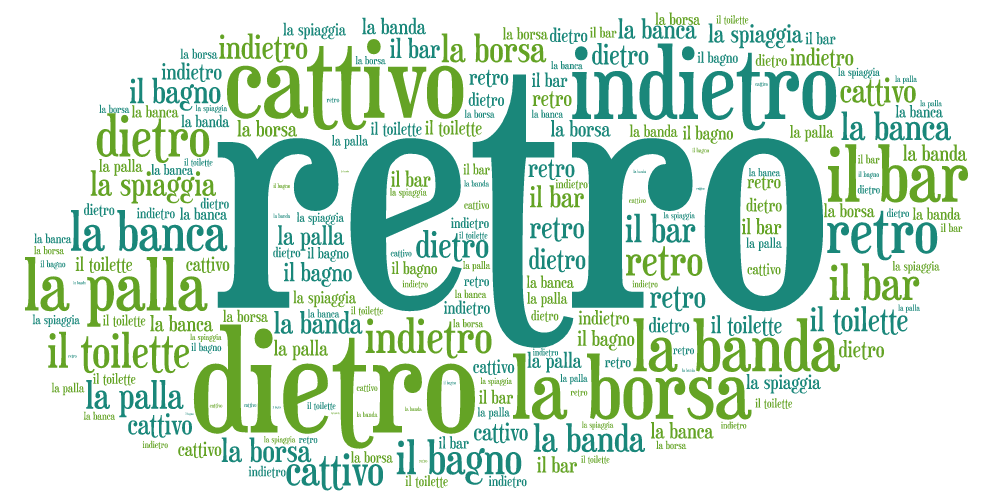This series focuses on Fluent Forever’s alphabetical list of the 625 most commonly used words in any language, presented 10 words at a time with their Italian translation.
“Not all words are created equal: we use certain words far more often than others…We get a lot of mileage out of our most frequent words…With only a thousand words [of your target language] you’ll recognize nearly 75 percent of what you read. With two thousand, you’ll hit 80 percent.”
–Gabriel Wyner, Fluent Forever

Image created at Tagul
Word bank: back (direction), bad, bag, ball, banana, band (music), bank, bar (location), bathroom, beach. Dietro; cattivo/cattiva; la borsa; la palla; la banana; la banda; la banca; il bar; il bagno/la toilette; la spiaggia.
Practice these high-frequency words on Quizlet.
Level: Give it a Try
- The students walk dietro the teacher.
- Go sul retro of the bus.
- The little boy was very cattivo.
- The children play with una palla on la spiaggia.
- First we will go to la banca, then to il bar for a coffee.
- La banda plays music.
- Il bagno is a room with a toilet and bathtub.
- “Where is la toilette?” asked the woman in the restaurant.
- Inside her borsa was a wallet, keys and una banana.
*travel note: when out and about, one needs to ask for “the toilet”. If you ask “where’s the bathroom (il bagno)”, people will think you are looking for the room with a bathtub!
Level: Challenge
- Gli studenti camminano dietro l’insegnante.
- Va sul retro dell’autobus.
- Il ragazzo era molto cattivo.
- I ragazzi giocano con una palla sulla spiaggia.
- Prima andiamo alla banca, poi al bar per prendere un caffè.
- La banda suona la musica.
- Il bagno è una stanza con una toilette e una vasca da bagno.
- “Dov’è la toilette?” chiesto la donna nel ristorante.
- All’interno della sua borsa erano un portafoglio, le chiavi, e una banana.
Helpful Grammar Links
- Plurals in Italian: In general, singular masculine nouns ending in “0” change to “i”; singular feminine nouns ending in “a” change to “e”. Some words end in “e” and always change to “i” in the plural.
- Adjectives are “matchy matchy” – the ending of an adjective matches in gender and number with the noun they are describing.
- Definite articles: Italian uses definite articles (“the”) much more than English, and each “the” can be different depending on if the noun in question is male or female.
- Indefinite articles (“a”/”an”)
Pronunciation resources
Forvo, Google Translate Content resources: Fluent Forever, WordReference
Reblogged this on Italian in Italy's Blog and commented:
Lexicon is the king if you want to really practice a language…
Nice post, totally agree, lexicon is the basis if you really want to speak a foreign language…
attention: dietro dell’insegnante, better “dietro l’insegnante” or “dietro all’insegnante” (even if you say dietro di me, dietro di lui, etc. but because you use a personal pronoun)
and, ragazzi, not raGgazzi
Thank you so much for the corrections. I had trouble putting the dietro sentence together, as you can see! Buona giornata!